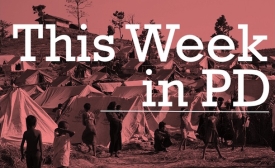international aid
As Boko Haram attacks increase in northern Nigeria, millions of refugees fleeing the Islamist insurgent group are creating a strain on local resources, aid groups say. More than a million Nigerians have been displaced as they attempt to flee Boko Haram’s violent attacks, according to the International Organization for Migration. They have settled in various cities around northern Nigeria, leaving aid groups and the Nigerian government scrambling to keep up with the growing demand for food and supplies.
A group of three UN special rapporteurs urged [press release] the international community on Friday to provide humanitarian aid and funding to Malawi after it experienced the worst flooding in recent history.

PD News headlines this week about Unicef, and foreign aid from the UK, Canada and the UN seem to suggest so.
With more than one in 10 of the world’s children living in areas affected by armed conflict, the United Nations children’s agency said Thursday that it is struggling to deal with “a new generation of emergencies.” Natural disasters, fast-spreading epidemics and conflicts “are stalking children in ways we have never seen before,” Afshan Khan, Unicef’s director of emergency programs, said in a statement accompanying an appeal for financial support.
The Department for International Development’s (DfID) extensive use of US organisations to strengthen parliaments in developing countries risks using British taxpayers’ money to promote “less accountable” American-style political systems at the expense of those based on the Westminster model, MPs have warned.
The Former Chancellor Lord Lawson has spoken out against plans to tie future governments to spending commitments on foreign aid. The Tory grandee said proposals to make all future administrations ‘gold plate’ Britain’s annual foreign aid budget would not help people in poor countries, the Express reports.
Every year Bill and Melinda Gates write an annual letter, laying out a strategy for eliminating poverty and suffering in the world. Here it is for 2015. These letters are a big event for a lot of reasons: They are smart, brief, readable and backed by a huge chunk of cash. This makes them one of the most widely read influential documents on international development every year. All the more reason to take a critical look and discuss.
WHO welcomes the appointment of the new United Nations Secretary-General’s Special Envoy on Tuberculosis (TB), Dr Eric P. Goosby, M.D. Dr Goosby’s extensive and high-level experience in global health and diplomacy give him the perfect background for this critical role. (...) WHO looks forward to working closely with Dr Goosby in our shared effort to raise the profile of the fight against TB and to attain the ambitious new targets agreed at last year’s World Health Assembly.







